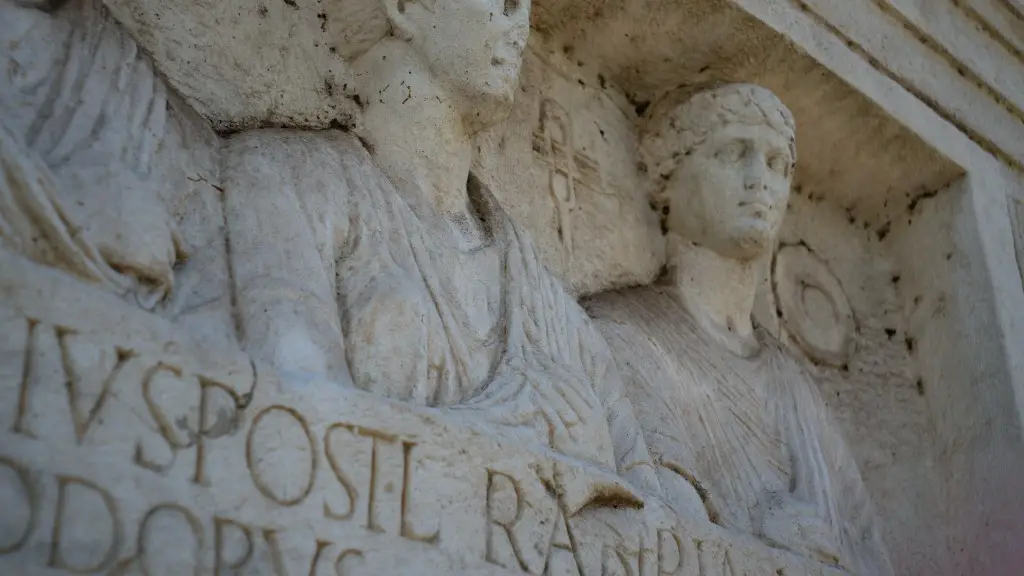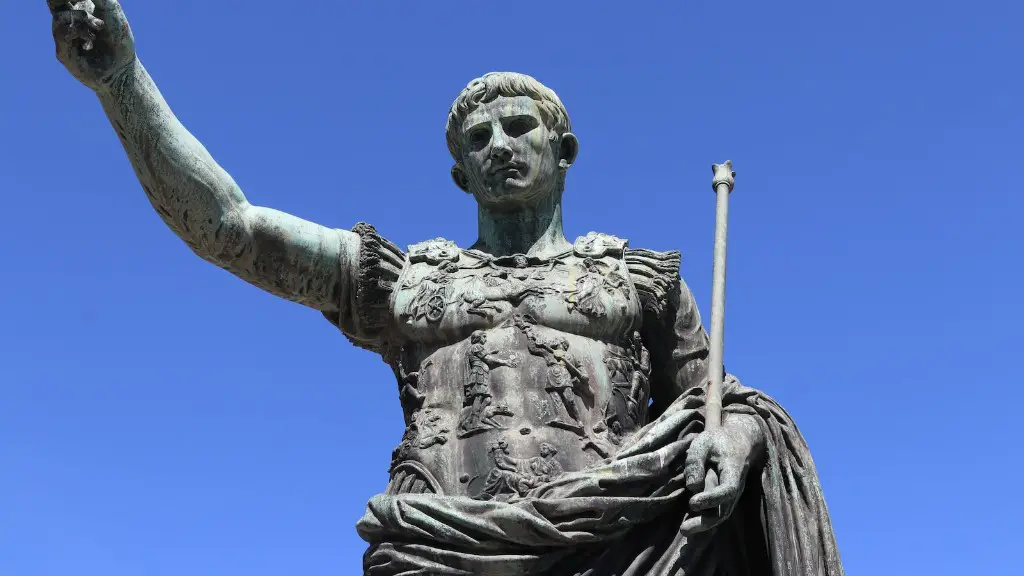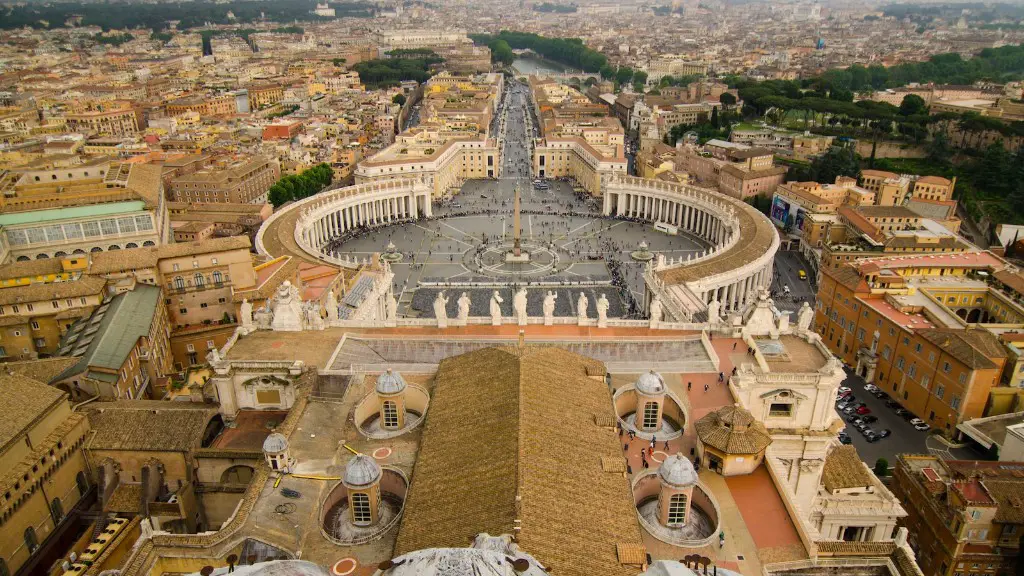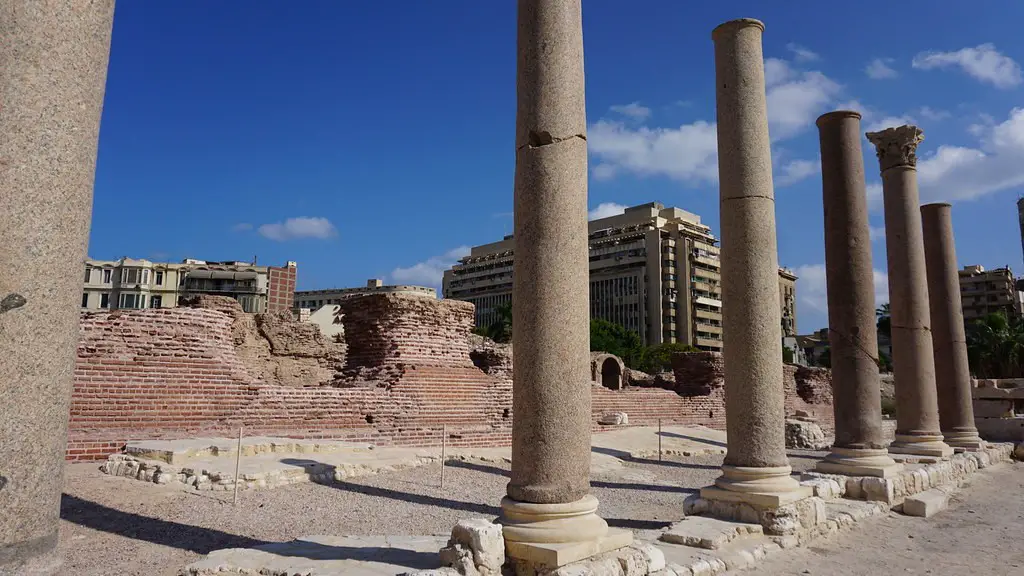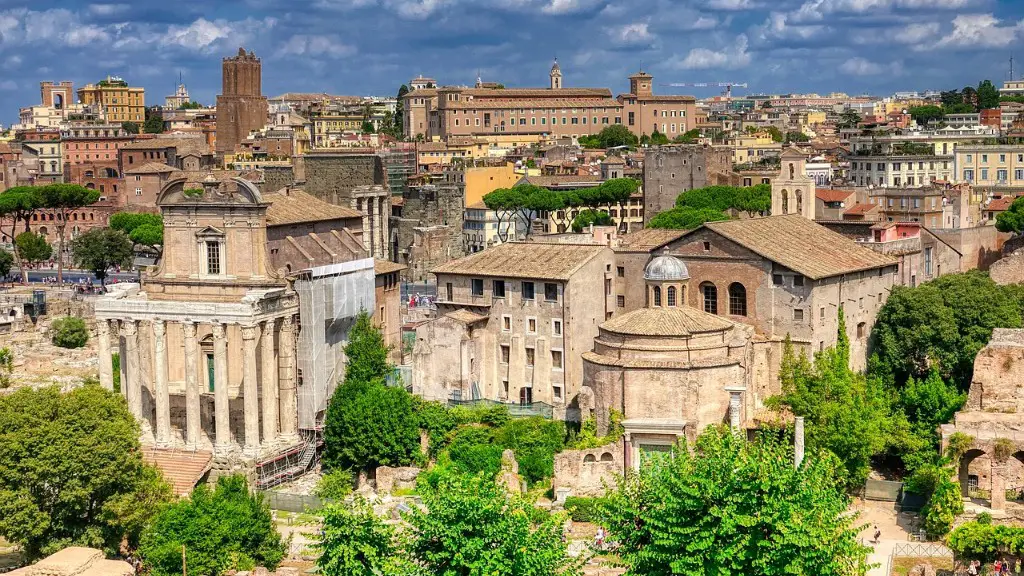The rise of the Ancient Roman Empire was unparalleled in human history and remains one of the most successful empires to have ever existed. Rome began as an insignificant settlement around the 9th century BC and by the 2nd century AD it had grown to encompass up to two million square kilometers of land. From the awe-inspiring Colosseum to the magnificent monuments and forts, the Roman Empire is renowned for its long-lasting cultural, political, and economic success.
Ancient Roman success was largely the result of their unique political and social infrastructure. Rome adopted the concept of direct representation from the Greeks; this enabled a meritocratic system that gave its people the opportunity to rise up through the political ranks regardless of social class. This ended over a millennium of dynastic rule, and offered citizens a say in government for the first time in history. Furthermore, the divided state of Rome addressed the important but mundane tasks at-hand, such as taxation and urban development. Through such systems, Rome was able to successfully incorporate newly-acquired provinces into its political infrastructure.
Another important factor in Rome’s success was the army. Armed with superior technology such as the famed dolphin-shaped cavalry shields, Roman soldiers were able to quickly subdue and capture territory. Battle tactics were also based heavily on the sophisticated and agile formation of the phalanx, with legionnaires forming a semi-circular enclosure around their targets.
The Roman state also had a strong and stable monetary system. The currency used was called the denarius, which was made mostly of copper or silver. This made it very difficult to counterfeit and gave the Roman economy a huge boost. It enabled the Roman Empire to save money, finance wars, and pay for trade.
Rome’s ability to combine its military power with its organizational prowess helped it to become one of the most powerful empires in the world. The Roman Empire was an astutely managed political entity which organized people, resources, and land in remarkable ways. It was also a cultural hub that mixed the various traditions and religions of the different peoples it conquered in an effort to create a more unified and peaceful society.
The Romans were also renowned for their innovative infrastructure. By building roads, bridges, and aqueducts, the Romans were able to improve the efficiency of their military operations and domestic trade. Furthermore, the creation of public baths, monuments, and amphitheaters was an effective means of demonstrating their political and cultural power.
Finally, Rome’s success was due in part to its legal system. Many important concepts and laws common today, such as the presumption of innocence and the right to a fair trial, were developed in Ancient Rome, giving citizens a sense of security. This, in turn, made citizens feel more loyal to the state.
Religious Influence
Religion and superstition played a vital role in the success of Ancient Roman society. Religion was deeply rooted in every aspect of daily life for the people of the Roman Empire. The dominant religion was polytheistic, worshipping many gods and goddesses. Public and private religious festivals and observances provided a sense of communal identity and a unity that was essential to Rome’s success. Furthermore, the pantheons of gods provided a comforting and reassuring belief system that aided the Romans in times of trouble, such as war or natural disaster.
Religious offerings and rituals were necessary to preserve Roman success. Behaviour, customs, and beliefs had to be in accordance with the prescribed religious rites and involvement in public religious events was essential for maintaining political stability. A complex network of priests, priestesses, and deities was established to address various issues. This enabled the empire to benefit from its citizens’ goodwill and provided them with a sense of security.
Roman religion also provided a structure for social organization. Temples and shrines were usually dedicated to the gods and goddesses, and these were places of assemblies, banquets, and sacrifices as prescribed by religious tradition. Finally, temples were regarded as a safe place to conduct financial transactions, and were used to store public documents and records. This enabled the government to recognize important milestones and decisions, and provided an effective way of resolving disputes.
Harsh Discipline
Rome was known for its strict and harsh policies. Crime, punishment, and war were seen as natural aspects of life, and they were taken seriously. Slavery was a common practice in Ancient Rome, and it was used to ensure that citizens followed laws, behaved as expected and remained loyal to the state. Physical punishments, such as flogging and crucifixion, were used as a way of discouraging misbehaviour. This strict disciplinary approach was essential for maintaining order, and it was an effective way of controlling the people and preventing rebellion.
Criminal justice was also stringent in Ancient Rome. Laws were based on the principle that citizens were accountable for their actions. Strict sentences were handed out even for the most minor infractions. Furthermore, justice was swift and arrests could be made on the spot, ensuring that criminals could not escape. This meant that Roman citizens were more likely to think twice before committing a crime, thus helping to maintain a level of law and order.
The penalties for breaking the law were often severe. Crimes that threatened the wellbeing of the empire, such as treason, were punished with death. Furthermore, debt could be punishable by imprisonment or even enslavement. Finally, punishments such as exile were imposed on those who violated public morals, such as adultery. Rome’s harsh and uncompromising approach ensured that citizens abided by the law and provided the empire with stability.
Education
Education was essential for Ancient Rome’s success. Education began in the home, and children from well off families would be sent to school. They were taught subjects such as math, philosophy, rhetoric and reading, the latter of which helped to develop literacy. This helped citizens gain the necessary skills to contribute to the political, economic and social life of the Roman Empire. Furthermore, education enabled the Roman Empire to develop a civil service that was capable of carrying out administrative tasks. This was especially important during times of war, when the state had to maintain order while dealing with the influx of refugees.
The Roman Empire was also renowned for its universities which helped to spread knowledge and promote the growth of civilization. The Empire’s universities were renowned for their quality of education and were attended by renowned intellectuals such as Marcus Tullius Cicero, who was renowned for his legal and political theories. The Roman Empire also had a thriving literary and philosophical culture, which produced works that continue to influence the world today.
Education was also important for ensuring civil order. Citizens were taught the importance of civic responsibility and the importance of upholding laws and traditions. This instilled a sense of pride and loyalty to the state and helped to maintain Rome’s power. Furthermore, educated citizens were able to contribute positively to various aspects of the Roman Empire, such as government, business and military. This enabled the empire to remain strong and prosperous, and enabled it to continue its reign for centuries.
Economic Power
The Roman Empire was renowned for its economic prosperity. This was largely due to its expansive trade network and colonial powers. Rome engaged in extensive trade with other countries, importing goods such as spices, fabrics, and slaves. It also exported minerals, ores, and foodstuffs across the world. The success of commerce was facilitated by the extensive road networks connecting different provinces of the empire, which enabled merchants and traders to easily transport goods. Cities such as Ostia and Lepcis Magna flourished as regional centers of trade and commerce. This allowed the Roman state to control regional prices and effectively manage its own finances.
Taxation was also an important source of income for the Roman Empire. It raised money for infrastructure projects and helped the Roman state pay for military operations. Rome also established various public works projects, such as aqueducts and temples, which provided work for citizens and boosted morale. Furthermore, the Roman Empire’s wealth was enhanced by its numerous natural resources, such as gold and silver, which were found in abundance in newly conquered territories.
In addition to its success in trade, the Roman Empire was highly prosperous in other areas. Agriculture, engineering, and crafts all contributed to the empire’s economic growth. Engineering was especially important as this enabled the Roman Empire to create large-scale projects such as temples, statues, and fortifications. The success of the Roman Empire’s engineering projects helped to strengthen its political control and enabled it to control its many provinces.
Administrative Excellence
Rome was renowned for its highly organized and efficient administrative system. It was divided into provinces, districts, and towns, which were administered by a series of bureaucrats and governors. This ensured that the Roman Empire was effectively run and that citizens from different provinces could easily access its services. Furthermore, the Roman bureaucracy developed an efficient system for monitoring tax revenue and collecting taxes from different provinces. This enabled the government to effectively fund its activities and ensure that citizens were paying appropriate taxes.
The Roman Empire also had a centralised justice system. Anyone accused of a crime would be tried in a court of law. This ensured that the guilty were punished and the innocent were exonerated. Furthermore, the Roman legal system developed the concept of presumption of innocence. This meant that an accused person was presumed to be innocent until proven guilty. This served as a major protection for citizens and helped to create an atmosphere of fairness and justice, which aided Rome’s success.
Other administrative reforms enabled the Roman Empire to remain efficient and organised. Laws were written and codified and the empire established a judicial system to ensure that the laws were followed. Furthermore, the language spoken in the Roman Empire was Latin, although various other languages were also used. This common language enabled the various peoples of the empire to communicate effectively, thus ensuring cohesion and unity.
Military Might
The Roman Army was one of the most disciplined and powerful fighting forces in the ancient world. It was composed of disciplined and loyal legionnaires that could fend off even the most determined foes. The Roman Legion was renowned for its durability and superior weaponry. It was composed of infantry and mounted cavalry and was the most organised and capable army in the world. The Roman army was also well equipped with weapons such as javelin, bows, and swords and was trained to formation fight. This enabled it to effectively fend off large-scale attacks and conquer difficult terrain.
The Roman army was aided by advanced siege weaponry and tactics. Catapults and battering rams were used to cause massive damage to enemy fortifications. Furthermore, the Romans became experts at building walls and fortresses, creating structures that could not be overthrown by their enemies. These structures enabled the Romans to effectively protect their own cities and secure their provinces from enemy forces.
The military success of the Roman Empire was aided by its superior naval forces. The Roman fleet was composed of powerful war ships and was capable of patrolling vast areas of ocean. By controlling the seas, Rome was able to extend its trade routes, protect its merchant ships, and defend its coastline from hostile attackers.
The Roman Empire’s successes can be attributed to its highly organised and advanced military forces. The entire Roman Empire was militaristic and its success was largely due to its superior techniques and training. This enabled the Roman Empire to conquer most of the known world and enabled it to remain a powerful force for centuries.
